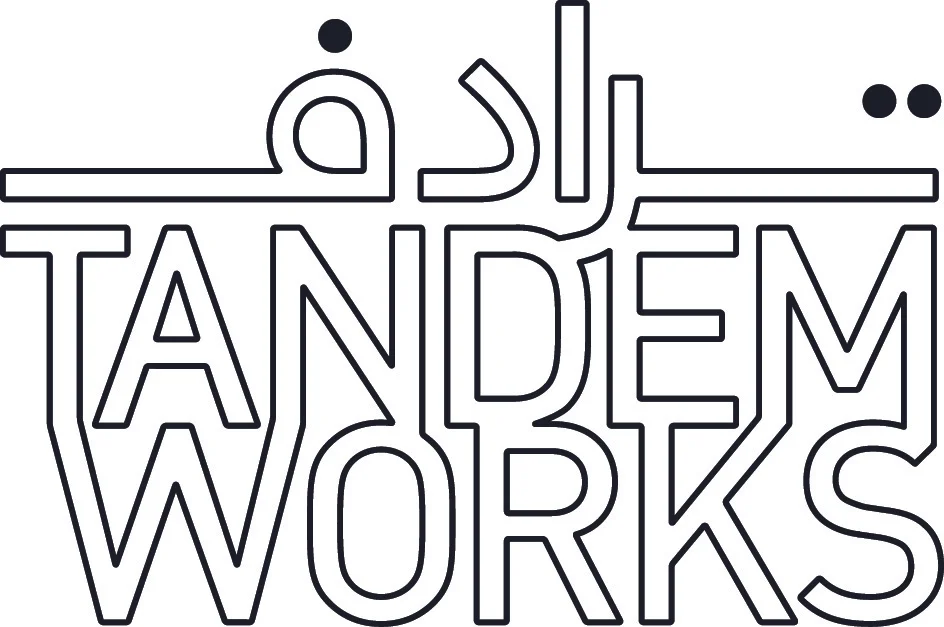KArantina Park
TandemWorks collaborated with Beirut-based landscape architects GreenStudios on commissioning a permanent installation dedicated to children and adults of all ages around the subject of Encounters, in Karantina's public park, a neighbourhood in Lebanon’s capital, Beirut. The commission came in the context of the park's renovation by Green Studios where a bridge was built to increase its surface area and created a vista, also a new library tucked underneath the bridge was created. We launched an open call inviting artists, designers, architects, sociologists and urban planners whether formed as collectives and/or individuals of all levels and nationalities to develop conceptual proposals for a playful and interactive installation. We focused on a community-engaged process the final object was developed through workshops with the residents of Karantina. Concepts represented values such as care for the environment, curiosity, inclusiveness and conviviality yielding a reflection on the nature and history of the surrounding, under the open-ended theme of Encounters.
The winning proposal was selected for their community driven process, their experience in building playgrounds in desolate areas and refugee camps but also because their involvement in the park will continue beyond the implementation phase through workshops and educational activities in the park.
Shortlisted Applicants: Burau, CatalyticAction, Richard Douzjian, Sirine Fattouh, Ali El-Darsa, Ieva Saudargaite and Bernard Mallat, Joe Namy.
Winning Applicant: CatalyticAction
CURATORIAL STATEMENT
Cities change, move and expand it’s worth asking in whose interest they do…
When a green spot survives the urban jungle that is Beirut, one may claim it as a miracle. However, when an entire neighbourhood remains untouched since the end of the civil war, on prime real estate, it raises eyebrows and many contentious questions.
The neighbourhood of Karantina was clearly delineating Beirut in the 1950s with a highway that separated it from the city. Throughout the following decades, this area lived a scarring period in parallel to Beirut’s own traumatic recent history ranging from sectarian and political boundaries, the presence of Sukleen’s waste disposal and treatment centre as well as Beirut’s slaughterhouse (closed in 2014), giving the name of “the Arabs of the slaughterhouse” ('Arab al- Maslakh) to its residents, an appellation further denoting a marginalised and segregated community. Shadowed by a lush line of dominant Eucalyptus trees, it is not uncommon to forget that this area even exists, often reminding us of our incapacity to deal with our past.
The notion of Encounters is here at the heart of TW’s concern, as a form of reclamation of spaces for free and open interaction amongst various strata, communities and residents. Our understanding of parks are spaces that allow rich interactions and experiences, where dialogue takes place; users are receptive to their environment and where ideas can stem and grow from play, coincidence, wanderings and most importantly that accumulate the experiences of its users and their own contributions to the spaces, all ages and races mixed. Those are some of the elements that Encounters intends to put forward as resistances to indoctrinated societies and to allow for creativity and imaginative ways of living outside set systems. On a more direct level, encounter facilitates play, bringing out key moments and experiences of childhood that are retained throughout adulthood. The capacity of transforming the most fixed forms and what could be interpreted by rigid minds as meaningless elements is the magic of play, itself turning into experience, learning and growing regardless of age.
TW’s Karantina park project intends to intervene as subtly as possible in physical space yet create numerous possibilities of play for regular users of all ages through Encounters. Open-ended and unfinished objects have the potential of triggering dialogues and a strong sense of empowerment, ownership, and endless interaction. Collaboration becomes a key element in the realisation of collective thinking and making that is designed to be perpetually done and undone. The curatorial framework of Encounters is equally wide and open- ended, to include key notions of collective memory, tolerance, chance, dwelling, curiosity, and discovery.
Turning a blind eye to the realities of marginal localities showed clear rejection by its residents to gentrification rules and formulas applied irrespectively of the surrounding references. In a chaotic and cluttered city such as Beirut, mental and physical spaces are a crucial component for healthy living, offering the opportunity to reflect on the nature and history of the surrounding while considering of conceiving a future.
JURY MEMBERS
Ayssar Arida, Founder, Urbacraft
Adib Dada, Founder and Lead Architect, theOtherDada
Alia Fattouh, Co-Founder and Director, TandemWorks
Rula Hajj-Ismail, Educator, International College
Mona El Hallak, Architect and heritage preservation activist
Zeina Kronfol, Co-Founder and Managing Partner, Green Studios
ABOUT GREEN STUDIOS
Green Studios is a landscape and technology platform that looks at reshaping the urban tissue by weaving greenery into the city's architecture using innovative and technological designs. Most of GS’ projects revolve around the hydroponics technology applied on green walls and roof gardens. Other projects tackle public spaces that are sensitive to the site’s environmental and social context. www.greenstudios.net
